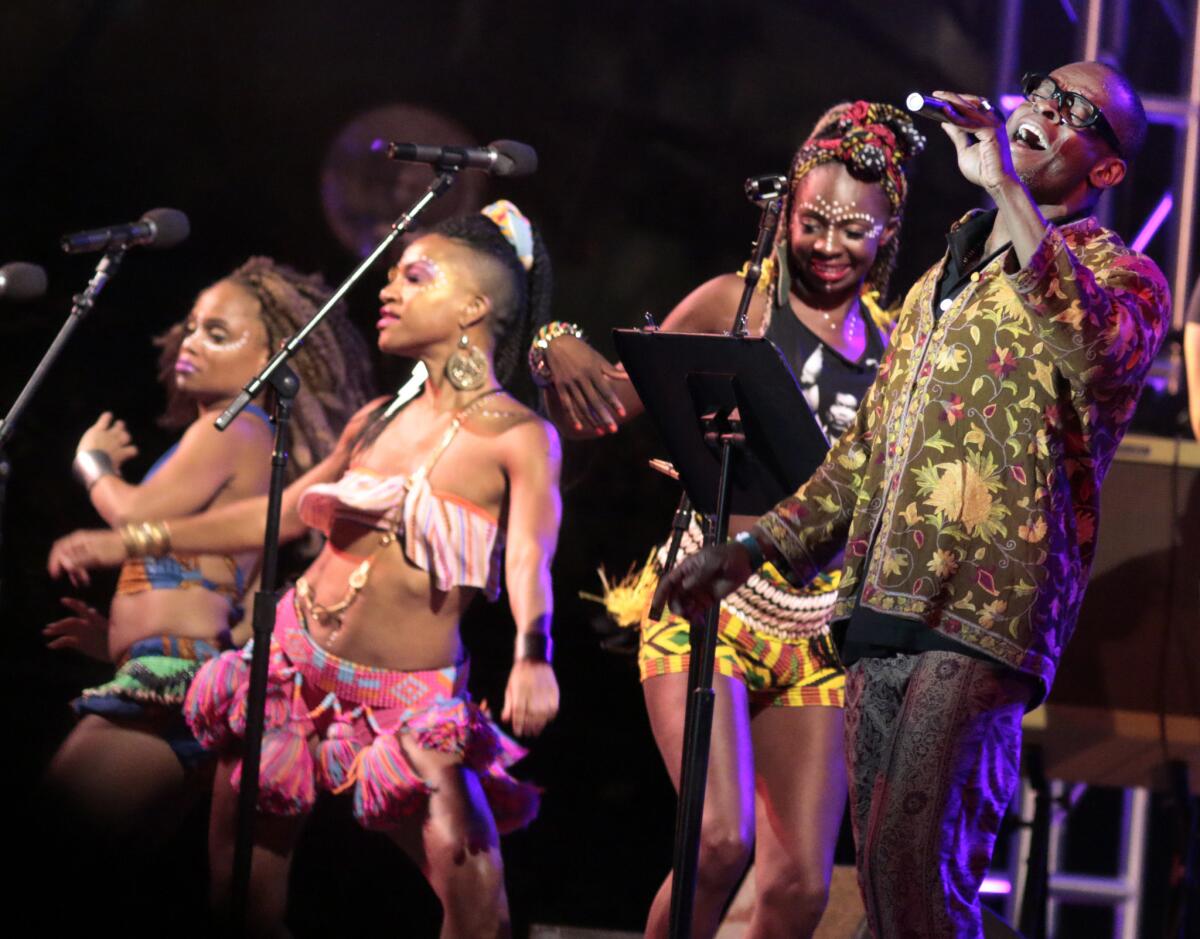Chop & Quench brings Fela Kuti’s ‘The ’69 L.A. Sessions’ to life

- Share via
It was proclaimed more than once over the evening at California Plaza that history was being made in downtown Los Angeles on Friday night as part of the Grand Performances series. For the first time, a choice selection of the iconic Nigerian bandleader Fela Kuti’s music, created during a flash of inspiration while living in L.A., was performed live in the city of its birth.
The band responsible, the Afrobeat unit Chop & Quench, replicated the recordings that comprise “The ’69 Los Angeles Sessions,” about a storied period in Pan-African music history.
Performing the funky, wildly syncopated compositions that the late musician-activist recorded while living here for much of 1969, the dozen players -- horns, percussion, guitar, bass, keyboards, dancers and singers -- celebrated the evolution of Kuti’s music, when his mission turned overtly political and his sound expanded.
FOR THE RECORD:
Fela Kuti: In the July 21 Calendar section, a review of Chop & Quench’s performance of Fela Kuti’s music at California Plaza on Friday night said Kuti and his band were deported from the United States. In fact, facing deportation due to lack of proper visas, the band returned to Nigeria. —
Singer Sahr Ngaujah and many of the onstage experts joining him know their way around the Kuti vibe. Many helped ferry the hit musical “Fela!” onto Broadway, and are hotshot New York session guys with deep resumes. The group featured players who have worked with, among others, Beyonce, Antibalas, Sade, Kuti’s sons Seun and Femi, the Roots and others.
Their sonic bona fides were confirmed early, within a few dozen exclamatory measures of “This Is Sad.” As a fading California sunset lit the surrounding high-rises, brass and beats sprung to life, erasing decades of distance.
During “Obe,” the group jumped into a groove like sprinters after the starter’s gunshot, ripping through four minutes of fast, percussive tones in which the players worked their instruments -- regardless of whether guitar, bass, drum, tenor or baritone sax, trumpet, voice or body -- like they were drums. Guitars clucked like the New Orleans funk of the Meters. A rolling, pointillist momentum during “Witchcraft” suggested James Brown’s backing band the JBs.
“This music hasn’t been performed live since 1970,” exclaimed Ngaujah, who earned a Tony nomination for his work in “Fela!” and here delivered music that Kuti created during a burst of inspiration. Before that moment, a key plot-point in the musical, Kuti was a bandleader. After, he used music to foment an idea that resonated across the continent and, ultimately, the world.
During his time in Los Angeles, Kuti and band had a residency on Sunset Boulevard in Hollywood (at a club owned by Chico Hamilton’s brother Bernie), which abruptly ended when they were deported. Upon his return home, Kuti renamed his band Nigeria ’70 and set about disrupting Nigerian politics through music.
To his credit, Ngaujah didn’t perform the show in character. Those expecting the singer, so electrifying on Broadway, to gig in a polyester pantsuit and assume the role of Kuti, with his bountiful way around the stage and singular dance moves, instead saw a less frantic performer. Content to honor the spirit through music rather than mimicry, Ngaujah and Chop & Quench avoided literal reenactment altogether.
Still, history is open to interpretation. For those to whom the notion of Fela in Los Angeles has meaning beyond a memorable Broadway plot-point, the idea that Chop & Quench itself was “making history” by playing this music sounded a little presumptuous when said aloud. Yes, it’s super cool to honor music like this, but certainly not a historic night by itself.
Which is to say, Dr. Dre’s classic record “The Chronic” has never been performed live either, but that doesn’t mean that four decades hence if a musically adept disciple raps the classic recording in its entirety that “history” will have been made. Or, should the excellent Beatles cover band the Fab Faux re-create “Sgt. Pepper’s Lonely Hearts Club Band,” the notion that scholars should take note is debatable.
But that doesn’t mean the whole gig wasn’t miraculously tight and often hypnotic, a show that extended deeper into Kuti’s catalog during a second set and multiple encores. To resurrect a moment as deep and musically memorable as Fela’s time in Los Angeles and have it feel as vivid and shocking so many years later can create its own kind of magic, whether it’s the Duke Ellington Orchestra performing all of “Ellington at Newport” or Mini Kiss re-creating “Love Gun.”
Raymond Carver called it “the lightning speed of the past,” those split-second occurrences that can shoot a long-buried memory into the here and now. For those for whom this event felt like a landmark, the way in which these sounds shot into the present was a thrill. Whether it was history or not is another story.
Twitter: @LilEdit
More to Read
The biggest entertainment stories
Get our big stories about Hollywood, film, television, music, arts, culture and more right in your inbox as soon as they publish.
You may occasionally receive promotional content from the Los Angeles Times.










